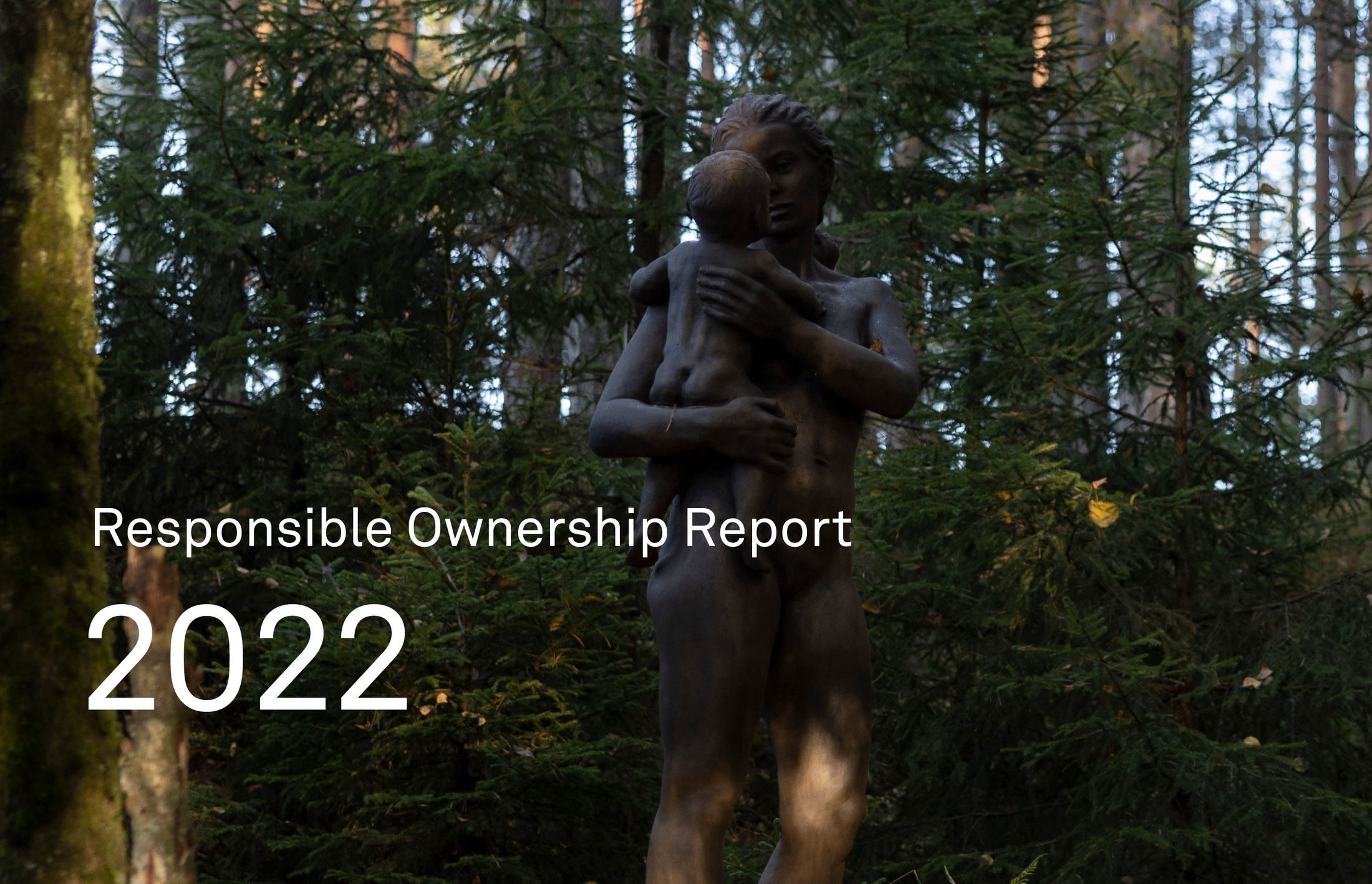Culture
Creating long-term value has been a driver in Canica’s philosophy since its foundation.The commitment, focus and moral compass of the owners, coupled with our employees experience and knowledge, assure that Canica is lean and forward-thinking.
We have a responsibility to act with the highest level of integrity. The fundament of sustainable development is to ensure that we make the world a better place for future generations. Our greatest contribution is how we manage our assets, what expectations we place on our investments, and how we leverage our ownership position to drive sustainable value creation.
Our people is our greatest asset
Canica consists of a small and dedicated team with offices in Norway and Switzerland. Many of our employees have worked at Canica for decades. Their dedication provides a stable and safe foundation, as well as unique insight and experience. We are also focused on attracting young talents with new perspectives and ideas on how Canica can prepare for the future.


Creating value through excellence
We highly value our moral compass: pursuing excellence in everything we do; from the way business is conducted to interactions with each other, our companies, the community around us and other stakeholders.
Canica stands for the core values of courage, consistency and competence.
Courage means that we aim to show a will to win in every aspect of our business. We seek to acquire and develop companies that offer the potential to earn sustainable and attractive returns on our capital.
Consistency means that we aim for a long-term approach towards our investments, always striving for a solid and stable economic foundation to ensure business continuity.
Competence means that we expect our companies to build a solid foundation and ensure that their value creation plan is sustainable.
Our greatest contribution to the Paris Agreement and the UN Sustainable Development Goals (SDGs) is how we manage our assets and the expectations we place on our investments.
We expect companies, where we have a direct or indirect ownership interest, to have a long-term goal of developing profitable business models that do not harm people or the environment, by respecting fundamental human rights, regulations for responsible use and management of natural resources.
Read our Sustainability Guidelines here.
Read our Transparency Act here. Our subsidiaries have written separate reports, available here: F&H Group AS, Jernia AS, The Well AS and Møbelhuset Invest AS.

Read our
Responsible Ownership Report here
The story of Canica really began in Oslo in 1953 when a young grocer from the valleys came to the city and started a company under his own name: Odd Hagen AS.
By 1976 Odd Hagen's company had grown to incorporate several grocery stores. His son, Stein Erik, was twenty years old and started to work for his father as a store manager.
Stein Erik Hagen proved to be both very ambitious and incredibly entrepreneurial. Only one year after starting to work for his father, he opened three stores - now under the name Rimi, with the slogan Easiest is Cheapest. Both the name, the slogan and Stein Erik's business idea proved to be genius and soon Rimi became a Norwegian household word. Stein Erik took over his father’s companies in 1980.
In 1987 the Rimi Group consisted of 53 stores with a combined turnover of NOK 1.9 billion. After ICA Handlarnas AB became a shareholder in 1992, the Group grew to 550 stores by the following year. In 1996 the group consisted of 1209 nation-wide stores with a combined turnover of NOK 18.6 billion. The Group eventually achieved a market share of 25%. Stein Erik sold his last Rimi-shares in 2004 – 27 years after opening his first store.
Canica was established as an investment company in 1985, focusing on retail, real estate and financial investments. In the late 1990´s the company bought its first shares in the Norwegian industrial conglomerate Orkla ASA. As of 2021, Canica controls 25% of Orkla, where Stein Erik has been Chairman of the Board since 2006.
From 2009 three of Stein Erik's children – Camilla, Caroline and Carl Erik have all taken a major role in the operation and governance of Canica and its investments. Caroline assumed the role as Canica’s Chairman, while Camilla and Carl Erik both hold several board positions in companies within the Canica sphere - in addition to taking an active part in the day-to-day operation of the company. Nicolai is still attending his studies in the UK.
Camilla lives in Norway, while both Carl Erik and Caroline live in Switzerland, where Caroline's husband, Christer Kjos, is the CEO of Canica Holding AG and Canica’s Swiss office. Stein Erik has over the years transferred most of his holdings to his children.
Odd Hagen died in 2011. His son, Stein Erik, still plays an active part in Canica's operations, while taking great pride in seeing the company's third generation flourish.
“What we have done for ourselves alone dies with us; what we have done for others and the world remains and is immortal.”
- Albert Pike
For decades, Canica has supported medical research within several disciplines. Contributions have primarily been made in four main categories within medical research: chronic diseases, cancer, infectious diseases and auto immune disorders. A substantsial amount has been donated so far, and our strategy is to continue supporting outstanding research communities for years to come.
Canica strive to contribute towards university environments nationally and internationally in order for the research to benefit as many people as possible.
Examples of areas that have been focused on up until now is: cardiovascular disease, prostate cancer, auto immune disorders in the digestive system. And recently emergency aid for research of the COVID-19 pandemic. Canica is especially proud to have contributed to the education of professors, diverse doctoral theses and protocols used to treat several diseases.
Research on Primary Sclerosing Cholangitis
Since 2007, Canica has supported research on primary sclerosing cholangitis (PSC) at the University of Oslo and Oslo University Hospital. PSC is an autoimmune disease that affects the bile ducts in the liver of young people and can lead to liver damage with a need for liver transplantation. PSC is more common in Norway and other Scandinavian countries than in the rest of the world and effective medical treatment is currently not available.
In order to improve the lives and prospects for people with PSC, Canica has provided annual donations to the University of Oslo to enable a comprehensive research program organized as the Norwegian PSC Research Center (NoPSC), which has become world-leading for research on this condition. The program involves searching for key disease mechanisms, understanding their clinical impact, along with implementation of new tools and therapies in clinical practice.
The research program has successfully delivered a series of key developments towards better management of PSC. In the early phases emphasis was put on increasing disease understanding through genetic studies and studies of gut microbiota, establishing PSC as an immune-driven disease and providing several potential drug targets. Detailed follow-up studies have been performed to understand the underlying mechanisms, which is necessary to develop new therapies. In parallel, the center has established clinical biomarkers for assessing drug efficacy and is currently developing a unique platform to investigate drug effects in the lab, using a bile-duct-on-a-chip platform. In addition, new tools for early detection of bile duct cancer, a complication of PSC, have been developed and are ready for implementation at the clinic. All these developments are now being put to work in the second phase of the program, moving towards clinical translation.
During the first wave of the Covid-19 pandemic, the Norwegian PSC Research Center was permitted to its laboratory and personnel to perform the first genetic study of severe Covid-19 in the world. The study identified mechanisms responsible for severe Covid-19 with respiratory failure and was published in the prestigious New England Journal of Medicine. The speed at which this study was done (less than 3 months from initiation to publication) was made possible through the support by Canica.
The research program illustrates the importance of stability and a long term vision to make transformative changes in medicine. The partnership with the University of Oslo has facilitated a professional and dedicated research environment to work in a goal oriented and efficient way to overcome the significant unmet needs of people with PSC. Read more
Cardiovascular Research
Since 2008, Canica, through Stein Erik Hagen´s Foundation for Clinical Heart Research (Stein Erik Hagen Stiftelse For Klinisk Hjerteforskning) has supported cardiovascular research at the Center for Clinical Heart Research (CCHR) at the Oslo University Hospital.
The strategy of the CCHR is built on systematic researcher-initiated clinical heart research, especially related to myocardial infarction, chronic arterial disease, heart failure and atrial fibrillation, lately with special focus on diabetes and the elderly.
In addition to clinical studies, based on standardized extensive biobanking, studies on disease mechanisms on cellular and genetic levels with modern methodology, as well as the potential effects of new treatment modalities are undertaken. The yearly donations from Canica contribute to the possibility to take advantage of new methodology and research approaches which develop very fast.
With their slogan “Team building for individual excellence” a main goal has been to constitute a dynamic research group with highly motivated participants, made up of PhD students, laboratory personnel and devoted post doc researchers, all with focus on future treatment of heart disease patients.
The donations have also contributed largely to international engagement through exchange of ideas and collaboration on the highest scientific level, to important contributions to international conferences and publications in highly rated journals.
Through the past 14 years of donations about 35 PhD theses from CCHR have been defended at University of Oslo, and about 250 publications in international journals have been produced. Read more
A selection of published articles:
- Omega-3 fatty acids intervention
- Inflammation in coronary thrombus
- Telomers and ageing
- Neutrophil extracellular traps and clinical outcome
The Canica Art Collection is first and foremost comprised of Nordic and Northern European fine art from the 19th and 20th Century – painting, sculpture and graphic work. Essentially, art historical movements of interest are: the Nordic avant-garde from the period around the First World War, abstract and nonfigurative art from the 1920s, Expressionism, Surrealism – artists associated with the CoBrA-group. Key artists among others are: J.F. Willumsen, Edvard Munch, Gösta Adrian-Nilsson, Erik Olson, Franciska Clausen, Wilhelm Freddie, Arne Ekeland, Vilhelm Lundström – and especially Asger Jorn, who is represented with more than 30 paintings. Also in the substantial print collection, Asger Jorn is an artist of key importance – represented with 300 works, including several of his most important graphical series. Other leading printmakers counts Edvard Munch, Rolf Nesch, Ludvig Eikaas, Knut Rumohr and Per Kleiva.
The Canica Art Collection collaborates closely with museums worldwide and works of art from the collection are on loan to several museum exhibitions, in Norway and abroad, at any given time.